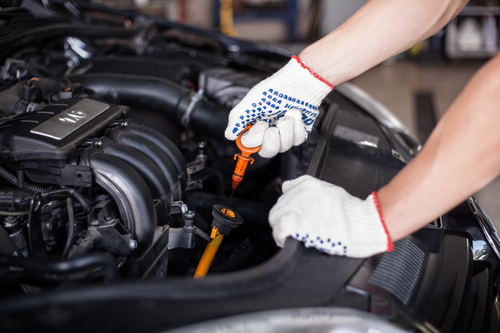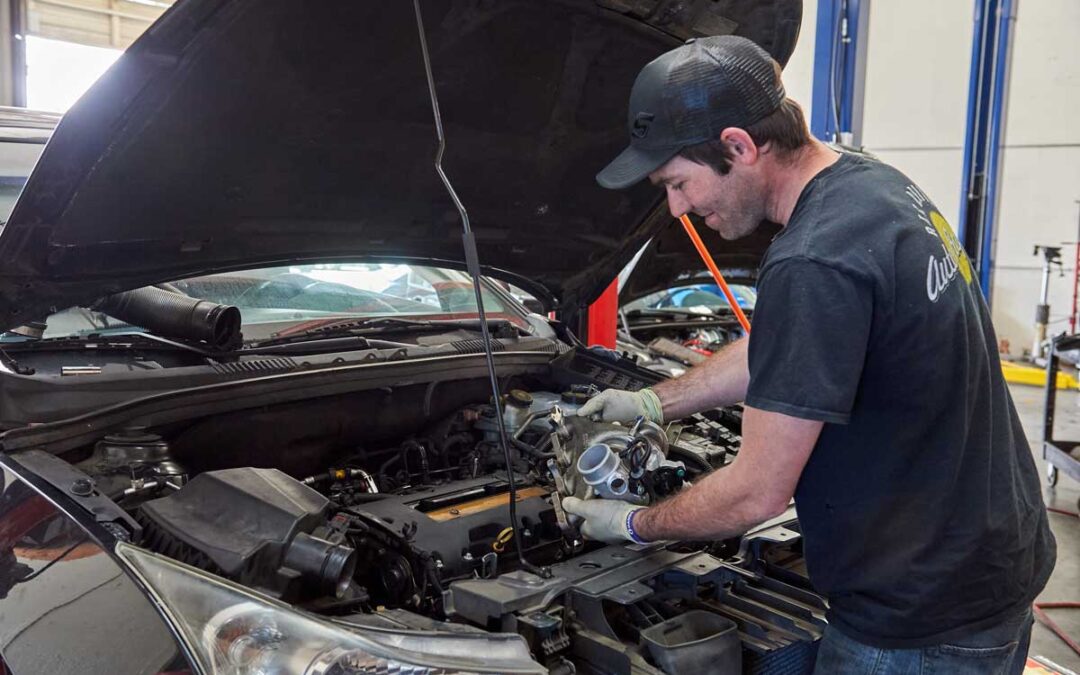Gas prices are on the rise yet again. That means that folks are looking for practical yet affordable ways to improve their fuel economy and get more oomph out of their engines. Turns out, a simple oil change helps you do just that.
In terms of bang for your buck, an oil change is pretty unrivaled in the auto maintenance and repair field. For what you might pay for a nice seat at a baseball game, you can get a cleaner engine that lasts longer and produces fewer harmful emissions. Talk about a great investment.
More Efficiency, Fuel Economy, and Savings
 An oil change actually allows your engine to run more efficiently. That means more fuel economy, and savings at the pump, as well as an engine that experiences less friction and wear because it doesn’t have what it needs to perform optimally.
An oil change actually allows your engine to run more efficiently. That means more fuel economy, and savings at the pump, as well as an engine that experiences less friction and wear because it doesn’t have what it needs to perform optimally.
In fact, the leading causes of engine failure and premature engine issues are friction and the wear and tear that results from it. An oil change can help lubricate critical engine parts and keep your engine clean.
How? It basically works like this. When you hit your accelerator a whole series of processes get underway under the hood. While you’re probably just concerned about getting on the tollway in time, your engine is working overtime.
The more that your engine works, the more debris particles are naturally emitted from the internal components of your vehicle’s engine.
These nasty particles can eventually get into your vehicle’s oil, which in turn can run through your engine as you go about your business and cause premature engine wear or even engine failure if you go too long without a proper oil change.
Routine Oil Changes Mean Less Harmful Exhaust
Regular oil changes from experienced, trained technicians helps ensure that your vehicle’s engine doesn’t come into contact with these nasty particles that can accumulate in your engine over time.
As extra benefits, cleaner oil bathing your engine provides more lubrication and causes your engine to run more efficiently. You’ll also experience less harmful exhaust since a cleaner engine produces less exhaust, and less dirty exhaust, than an engine that’s swimming in old oil.
A regular oil change is essential for your engine’s life, fuel economy, and fewer harmful emissions. Cleaner oil also leads to better mechanical performance – in the car world, you’re boosting your mechanical output.
In layman’s terms, this means that when you hit the gas you’ll actually move off the starting line and produce less harmful emissions for those taking it all in on the sidelines. The connecting rods and crank shaft inside your engine will thank you later for getting an oil change on a routine, timely schedule.
Pass Your Upcoming California Emissions Test
By getting your oil changed regularly, you might also pass your emissions tests the first time out. California has some of the toughest emissions standards anywhere in the United States. If your vehicle is seven years or older, you might have to get an emissions test every two years in California.
Getting an oil change should improve your chances of passing an emissions test since, all things being equal, cleaner oil leads to a more efficient engine and fewer hydrocarbons being shot out of your vehicle as exhaust.
That’s what the emissions tests are looking at…yet another reason to stop into All Around Auto Repair for a quick oil change. An oil change can take as little as 15 minutes, and you can enjoy a nice cup of Joe as you wait. It’s a convenient, easy, and affordable way to improve your vehicle’s performance.
FAQ: Oil Change Benefits and Savings
1. Why is an oil change important for fuel economy?
An oil change ensures your engine runs efficiently, leading to improved fuel economy and savings at the pump. It reduces friction and wear, preventing premature engine failure and costly repairs. With clean oil, your engine operates smoothly, maximizing its performance and lifespan.
2. How does an oil change prevent engine wear and tear?
Regular oil changes lubricate critical engine parts, reducing friction and minimizing wear and tear. By keeping your engine clean and properly lubricated, an oil change prevents debris buildup and maintains optimal engine performance, enhancing longevity and reliability.
3. What role does oil cleanliness play in emissions reduction?
Clean oil results in fewer harmful emissions, contributing to a cleaner environment. It reduces the production of dirty exhaust, making your vehicle more environmentally friendly and compliant with emissions standards. An oil change ensures your engine operates efficiently, emitting fewer pollutants into the air.
4. Can an oil change help pass emissions tests?
Yes, routine oil changes can improve your chances of passing emissions tests. Clean oil leads to a more efficient engine, producing fewer hydrocarbons in exhaust emissions. In states like California with stringent emissions standards, regular oil changes are crucial for ensuring compliance and passing emissions tests.
5. How does an oil change benefit engine performance?
A regular oil change enhances engine performance by maintaining proper lubrication and reducing friction. It ensures smoother operation, allowing your engine to deliver optimal power output. With improved mechanical performance, your vehicle accelerates more smoothly and efficiently.
6. Why should I prioritize routine oil changes?
Prioritizing routine oil changes is essential for your engine’s health and longevity. It prevents costly repairs, extends engine lifespan, and improves fuel efficiency. By investing in regular maintenance, you protect your vehicle’s performance and preserve its value over time.
7. What are the consequences of neglecting oil changes?
Neglecting oil changes can lead to engine damage, reduced fuel efficiency, and increased emissions. Dirty oil causes friction and wear, resulting in premature engine failure and costly repairs. By ignoring oil change intervals, you risk compromising your vehicle’s performance and reliability.
8. How often should I schedule an oil change?
The frequency of oil changes depends on your vehicle’s make, model, and driving conditions. Generally, it’s recommended to change oil every 5,000 to 7,500 miles or every six months. However, consult your owner’s manual or a trusted mechanic for personalized recommendations.
9. Can an oil change be done quickly and affordably?
Yes, an oil change is a quick and affordable maintenance task that can be completed in as little as 15 minutes. At All Around Auto Repair, experienced technicians provide efficient oil changes, ensuring convenience and quality service. It’s a simple yet effective way to improve your vehicle’s performance and longevity.
10. What are the long-term benefits of regular oil changes?
Regular oil changes offer long-term benefits such as extended engine life, improved reliability, and reduced maintenance costs. By maintaining clean oil and proper lubrication, you protect your engine from premature wear and damage, ensuring consistent performance and peace of mind on the road.


